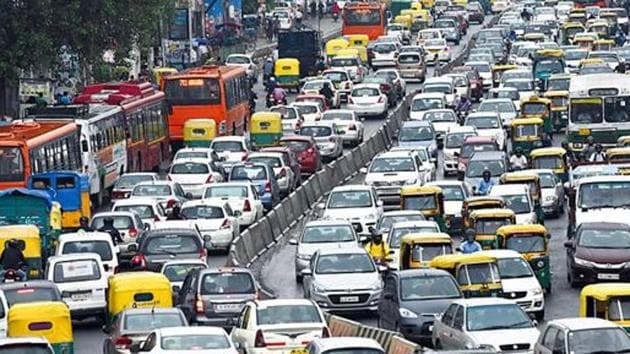Odd-even rule makes a comeback in Delhi, evokes mixed response from RWAs
Resident welfare associations (RWAs) believe there is no harm in experimenting with the scheme again, as it does help reduce traffic congestion. But many residents and experts maintain that this time it should come without exemptions.
The Delhi government’s decision to bring back the odd-even road rationing scheme post-Diwali if air pollution levels reach emergency levels drew mixed reactions from people and experts in the city.

Delhi chief minister Arvind Kejriwal on Friday announced a rerun of odd-even from November 4 to November 15, as part of a seven-point action plan to combat peak pollution levels.
Resident welfare associations (RWAs) believe there is no harm in experimenting with the scheme again, as it does help reduce traffic congestion. But many residents and experts maintain that this time it should come without exemptions.
Also Read I Experts suggest turning to odd-even, pollution masks
In 2016, the Delhi government during the two phases of implementation of odd-even --- January 1-15 and April 15-30, 2016 ---had exempted women drivers and two-wheelers, which are one of the major sources of pollution.
“There is no harm in bringing the scheme back, as there is a major reduction of traffic on key roads, which clearly has a slight effect in bringing down pollution levels. Post-Diwali, the air is not breathable, in particular for the elderly. If such a measure helps even marginally during this phase, it must be resumed, however, without exemptions. If two-wheelers are exempted, again, it will defeat the entire purpose of the efforts made,” said B S Vohra, president, the federation of East Delhi RWAs.
When asked about inconvenience faced by people due to lack of a robust public transport system in the city, Vohra said, at one point in time for a city with such a massive population, people have to switch to public transport.
“For how long will we keep buying more vehicles and adding to congestion? During the first round of the scheme, many people started buying second-hand cars and two-wheelers, which should not be the case this time,” he said.
However, there are others who said that traffic congestion does reduce, but the air is still bad during this period.
“The air is bad during this particular time of winter despite odd-even. Although the roads are freer, there is a section of people such as senior citizens, who cannot walk for long and access public transport. It becomes difficult for them to commute even for routine medical check-ups,” Suresh Goel, a resident of Vasant Vihar and general secretary, the confederation of NCR RWAs said.
According to Atul Goyal, president, URJA (United Residents Joint Action), an umbrella body of 2500 RWAs, said it is a pre-emptive measure being taken by the government ahead of the Delhi Assembly elections due early next year. “This scheme will have any real effect only when the public transport systems are ramped up. It does increase mobility but there is no real change in air pollution,” said Goyal.
Experts too said that with exemptions, the scheme did not turn out to be a success.
Ravinder Kumar, a principal scientist at the transportation and planning division of the Central Road Research Institute (CRRI), said that in previous attempts too, odd-even vehicle rationing was not as successful as planned because of the exemptions put in place especially for two-wheelers.
“If your aim is to reduce emission levels, then exempting two-wheeler is going to defeat your purpose. Two wheelers make for nearly half the city’s vehicular volume and its engine releases more pollutants. They (the government) kept them out because of popularity or vote bank, whatever their reason was, it resulted in the plan not working out,” Kumar said.
Get Current Updates on India News, Lok Sabha Election 2024 live, Infosys Q4 Results Live, Elections 2024, Election 2024 Date along with Latest News and Top Headlines from India and around the world.




